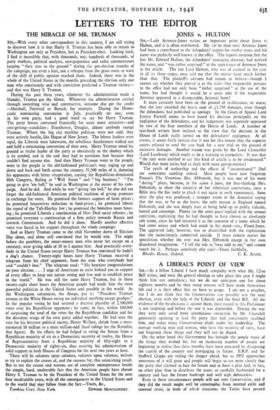JONES v. HULTON
Sm,—Lady Artemus-Jones makes an important point about Jones vJ Hutton, and it is often overlooked. Mr. (as he then was) Artemus Jones had been a contributor to the defendants' papers for twelve years, and his name was perfectly well known in the office. The reports mention that the late Mr. Edward Hulton, the defendants' managing director, had noticed the name, and " was rather surprised" at the appearance of Artemus Jones in the article. The late Lord Hewart, who was of counsel in the case in all its three stages, once told me that the matter went much farther than that. The plaintiff's advisers had reason to believe—though I cannot say whether they proved it at the trial—that responsible persons in the office had not only been " rather surprised " at the use of the name, but had thought it would be a great joke if the respectable Artemus appeared in a disreputable, fictional form!
It must certainly have been on the ground of recklessness, or worse, that the jury awarded the heavy sum of £1,750 damages, even though the defendants had published an apology. In the Court of Appeal Lord Justice Farwell seems to have based his decision principally on the negligence of the defendants, and his judgement was expressly approved by two of the four members of the House of Lords. A number of text-book writers have inclined to the view that the decision in the House of Lords really turned on the defendants' negligence. At all events, it seems fairly certain that it was for this reason that the superior courts refused to send the case back for a new trial on the ground of excessive damages. Another reason was given by the Lord Chancellor (Lord Loreburn) which ought to be a warning to journalists. It was that " the jury were entitled to say this kind of article is to be condemned." Would that more juries had so dealt with more gossip-writers!
The perils of authorship and the effects of " unintentional " libel are sometimes startling indeed. Most people have now forgotten Pinero's The Notorious Mrs. Ebbsmith, but it was one of his more "daring" plays, because, in the scene a faire, the free-thinking Mrs. Ebbsmith, to show the sincerity of her atheistical convictions, casts a Bible into the fire (only to pluck it out again in swift repentance). Soon after the play was produced, a stranger wrote to the dramatist saying that she was, so far as she knew, the only person in England named Ebbsmith, and she was deeply hurt at being held up to public ridicule, hatred and contempt. Pinero (so the story goes) replied with the utmost contrition, explaining that he had thought to have chosen an absolutely safe name, since he had invented it as the converse of a name which he had come across and which had stuck in his mind—viz., Flood-Jones. The aggrieved lady, however, was so dissatisfied with the explanation that she incontinently committed suicide. It must remain matter for speculation whether she ever was Mrs. Ebbsmith except in her own disordered imagination. " I tell the tale as 'twas told to me," and cannot vouch for it. Perhaps somebody else can?—Yours faithfully,


































 Previous page
Previous page